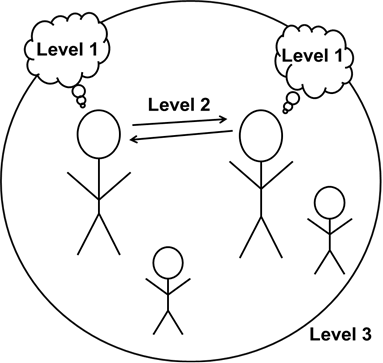Jun 10, 2015
[This post is the first in a summer series of three posts on Three Levels of Listening. Stay tuned for the remaining two posts in this series, and download the tipsheet Three Levels of Listening in the meantime!]
Imagine this:
You are at a learning event, one you did not design, and you listen intently to the facilitator and your peers as a lively discussion plays out like beautiful chords of music throughout the room. You are mesmerized as the voices rise and fall – sometimes softly, sometimes loudly – in a rhythm that seems to be led by an unseen conductor. You are drawn to participate in the group discussion as much as possible and speak your mind and share your wisdom, and questions, freely.
All of the sudden you are surprised to find that the event is over and the lights are flickering as a sign that it’s time to go. As you make your way out the door you are basking in what felt like an orchestrated musical event. You wonder to yourself, “What just happened?” – you can’t remember the last time you were so engaged.
You can’t wait to meet up with your two friends, who also attended the event, at a local café and discuss the experience. As the three of you arrive at the café and find an open table, you can barely wait to be seated before you burst with exuberance about the event. You use words like “orchestra”, “musical”, “beautiful”, “freedom”, and “love” to describe your experience. Your friends listen to your animated description and nod. They felt it too. They add words of their own like “lively”, “friendly”, “intense”, and “peaceful.”
You sit back in your chair and relive the enjoyment of the event with your friends.
Level Three – Listening to the Emotional Field (of the Whole)
There are many aspects to listening, and I’d like to draw your attention to three distinct levels. Level One is where you listen to what is happening inside of you. Level Two is where you listen to another person with focus and attention. Level Three is when you listen to the broader emotional field, or dynamic, around you. We all take in information on these three levels, but we are not always paying attention to all three levels. The story above is an example of Level Three Listening as the three friends describe the emotional field they experienced at the event.

Imagine that you can turn a knob and fine tune your listening to pick up on the emotional field or dynamic that is present in a family, team, or event.
- Think of a time in the recent past when you were very aware of the dynamic around you and it made you uncomfortable. What words would you use to describe the emotional field in that experience?
- Now think of a time when you were aware of a fun or joyful dynamic, like in the learning event story described above. What words would you use to describe the emotional field in at experience?
Congratulations, you just practiced honing your listening skills to capture and name the dynamic or emotional field that was present in your experience. You may have noticed that this skill is one you already have working for you. The purpose of this blog post is to draw your attention to it so you can strengthen it and use it more intentionally. Some people call the ability to name the emotional field accessing “intuition.” Others call it something they just know in their “gut.” What do you call it?
Reflection
- What benefit is there to being aware of and listening for the emotional field in a group situation?
- In a learning event, once you pay attention to the emotional field, how might that help you deepen your learning as an individual? As a team?
- What is the dynamic you anticipate you will be walking into at your next work meeting? What was the dynamic at your last meeting?
- How comfortable are you with paying attention to listening to the emotional field?
- As a leader, how might awareness of the emotional field help you lead more effectively? What can you do to shift the emotional field to be more conducive to learning in a group setting?
Practice
What if you were to set an intention to listen to the emotional field of your family or workplace throughout this next week? You can do this by taking a break every two hours or so throughout the day and asking the question “What is the dynamic now?” Then consider what two or three words come to mind that describe the “vibe” in the room. Now that you have expanded your awareness of the current dynamic, how might that influence what you do next?
Are you willing to take on the challenge? If so, please post your learning in the comments section below and let’s learn together what Level Three Listening has to offer us this week!
Stay tuned for another post soon on Level Two Listening.
****
Wendy Balman wendy@wendybalman.com is an ICF professional certified coach, a consultant and a coach trainer practicing in Chicagoland, IL, USA. Her passion is to provoke people to deeper learning and to grow their capacity to creatively address life’s challenges and opportunities with joy.



